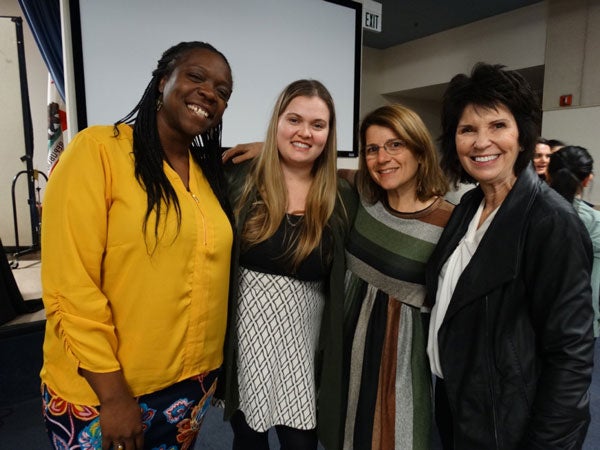AIR-B 4 will continue to engage families and communities in effective evidence-based ASD interventions

AIR-B team at the 2019 Autism Conference
For the fourth time, Dr. Connie Kasari has obtained funding for the Autism Intervention Research Network for Behavioral Health (AIR-B 4), which she has led since 2008. The University of California, Davis, University of Pennsylvania, University of Rochester, Drexel University, University of Kansas, and the University of Washington are sites also participating in this new grant. AIR-B 4 uses community-partnered participatory research (CPPR) and implementation science to disseminate interventions that engage families and communities in effective evidence-based autism spectrum disorder (ASD) interventions. Since 2008, the AIRB network has conducted multiple studies in the community with primarily low income, minority families with children with ASD (over 3,000 families). AIR-B 4 will continue this tradition with greater focus on implementation strategies to sustain interventions in the community.
AIR-B 4 has proposed three main studies, all of which will use an implementation strategy called UNITED: Using Novel Implementation Tools for Evidence-based intervention Delivery. UNITED is a team-based approach that uses social network analysis to identify members of the team who will implement each intervention, and TeamSTEPPS (Team Strategies and Tools to Enhance Performance and Patient Safety), an evidence-based set of teamwork tools that optimizes communication and teamwork skills. AIR-B 4 studies will involve partnering with community providers to implement the three studies that will be the focus of this grant.
The first study, Mind the Gap, focuses on providing resources and support for families soon after a child is diagnosed with ASD and under the age of 8, which has been shown to improve family empowerment and increases access to services. They will provide a variety of materials in English, Spanish, and Korean to best tailor to each family’s needs. Peer navigators (mothers of children with disabilities, or staff working in Federally Qualified Health Centers) will implement the Mind the Gap intervention with support from the research staff.
In their second study, Remaking Recess, researchers will help children with ASD improve their peer relationships at school. The AIR-B 4 team will partner with school district personnel to deliver the intervention in Title 1 schools. The students with ASD for this study will be in elementary school and range from 5 to 12 years of age.
In the third study, Self-Determination Learning Model of Instruction, adolescents with ASD can gain self-determination, which is the ability to act as a causal agent in one’s own life in order to attain goals. Through the three-phase instructional process, the students will gain the necessary skills for success later in life. This study also involves partnering with school district personnel. The students with ASD recruited for this study will be in high school and between the ages of 13-22.
AIR-B 4 will also continue activities from previous grants including community conferences for families of children with autism. The Los Angeles conference is in partnership with Healthy African American Families, and usually held in March at Holman United Methodist Church in South Los Angeles.
To learn more about the AIR-B 4, contact: Consuelo Garcia at cogarcia@mednet.ucla.edu.

